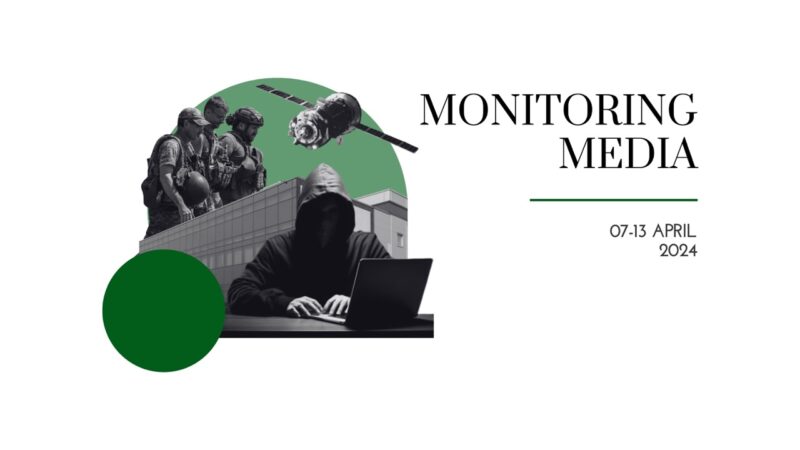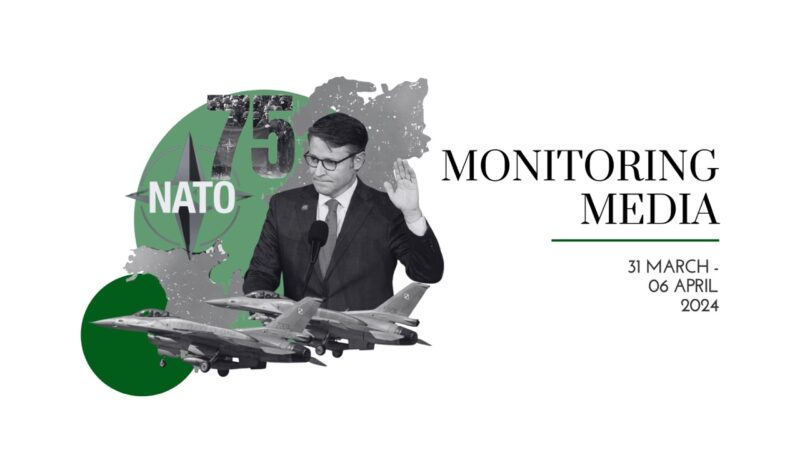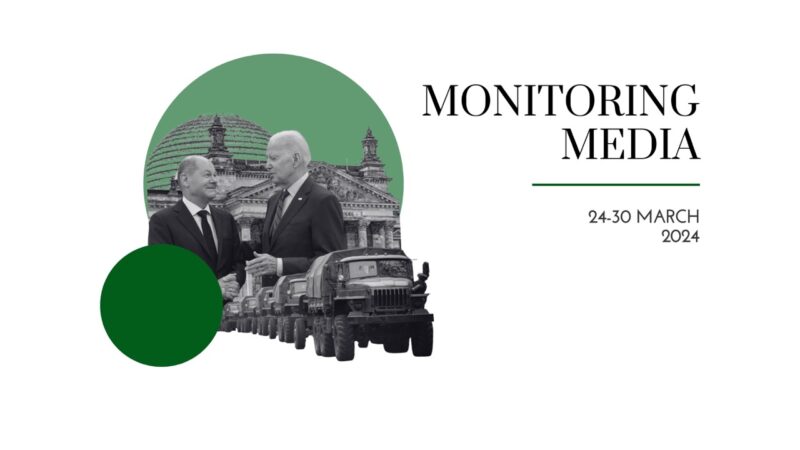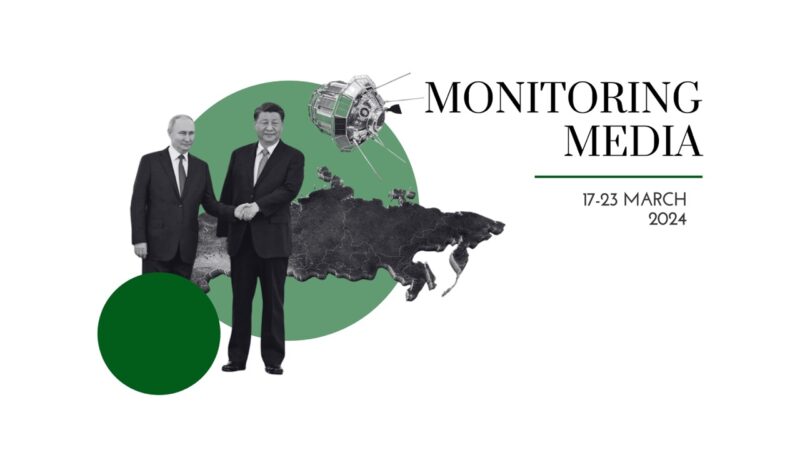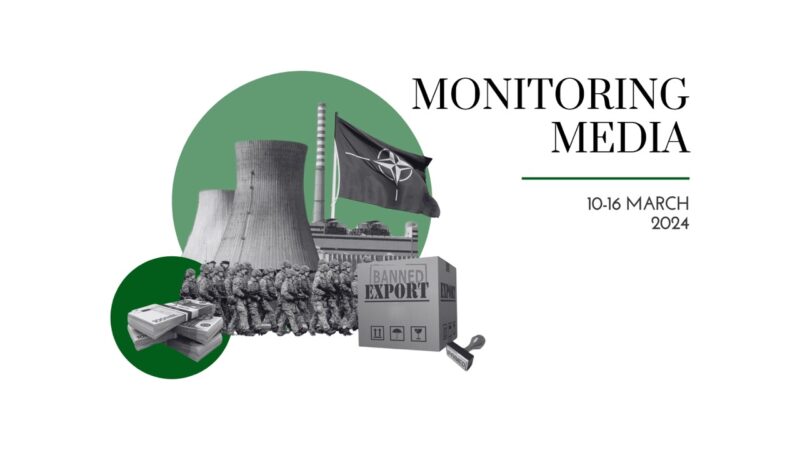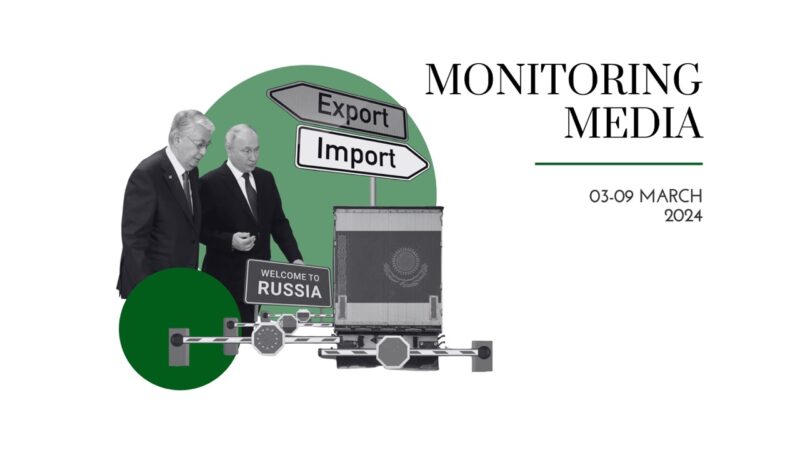Cornered Kremlin decides to escalate
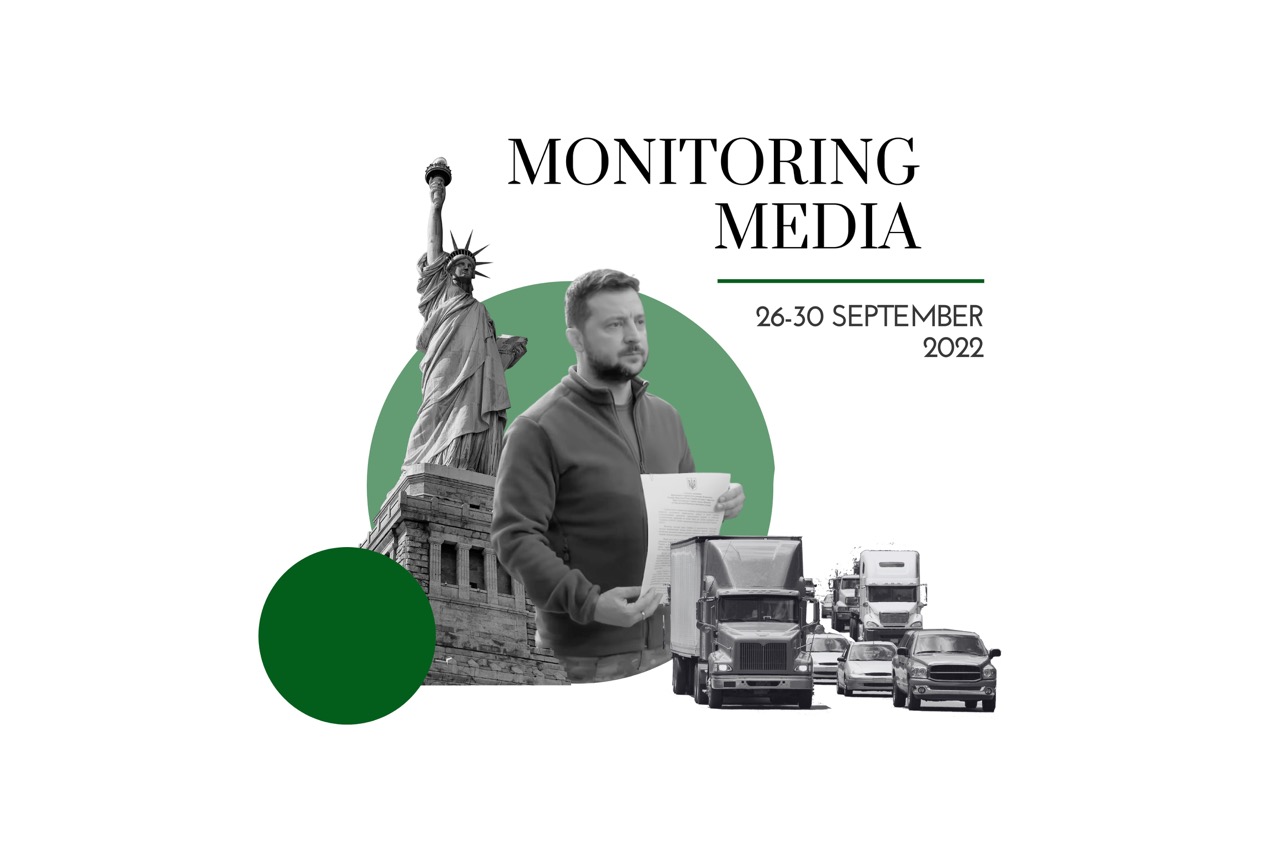
CIUS weekly report on media coverage of Ukrainian affairs, 26–30 September 2022
Three North American magazines (Foreign Affairs, Foreign Policy, and The New Yorker) were selected to prepare this report on how the situation in Ukraine has been portrayed in the media during the week of 26–30 September 2022. The sample of magazines was created based on their impact on public opinion as well as their professional reputation, popularity among the readership, and topical relevance. These three magazines represent the centrist and liberal political spectrum.
This report covers only the most-read articles about Ukraine, as ranked by the respective magazines themselves in the given week. It also covers promoted articles on home pages as well as articles from special sections on Ukraine, with the hashtag #Ukraine, from the paper editions of the magazines, and about Ukraine from opinion columns and editorials.
Topics featured in the selected articles:
- Ukraine’s current affairs: Zelensky submits application for NATO membership; Ukraine meticulously recording all of Russia’s war crimes; Ukrainian soldiers in the US ask for more heavy weapons;
- The world and Ukraine: Washington will strengthen its global position by helping Ukraine win; Germany is pressed to supply more arms to Ukraine and do it faster; European states close their borders to Russian citizens; EU needs to revise its energy sustainability plans; Western sanctions against Russia are no less impactful on the developing world;
- Russia at war: only option for the war to end is for Russia to pull out; latest mobilization and mass movement of troops in Russia eroding the legitimacy of Putin’s regime; Putin’s obstinate desire to win may lead to the outbreak of nuclear war.
The most common arguments:
Fast-tracking Ukraine’s NATO membership easier said than done. Robbie Gramer, Jack Detsch, and Amy Mackinnon (Foreign Policy) state that “Ukraine likely won’t join NATO anytime soon, but [its application is] a big symbolic move in a war that’s increasingly going against the Kremlin.” On 30 September, coinciding with Russian President Putin’s unilateral incorporation of occupied territories of Ukraine into the Russian Federation, Ukrainian President Zelensky delivered the message that Ukraine and its army had achieved the necessary standards and de facto could join NATO under an accelerated procedure. In turn, on the same day NATO Chair Jens Stoltenberg declared that every democratic European nation has a right to apply for NATO membership, including Ukraine. Under the circumstances, however, Gramer, Detsch, and Mackinnon do not believe that Ukraine will join NATO under the accelerated procedure, at least not before a few conditions are met. First, Kyiv needs more profound reforms in the national army and security structures. Second, in light of Article 5 of the NATO Treaty (i.e., the guarantee of common defence), Ukraine would not be welcome in the alliance until it regains full control of the territories within its recognized borders. Third, Kyiv needs to carry out numerous diplomatic preparations and convince the thirty current NATO members that Ukraine is worth accepting. Finally, there is really no such thing as a “fast-track” membership, as even Finland and Sweden have been waiting for months after their applications and have yet to be accepted into the alliance. Gramer, Detsch, and Mackinnon conclude that the issue of Ukraine’s NATO membership should not be prioritized over developing programmes of immediate, ongoing, and uninterrupted arms supply.
On liberated lands Ukraine continues documenting Russia’s crimes. Melinda Haring and Vladislav Davidzon (Foreign Policy) begin with the statement that “Putin is seeking to bludgeon Ukraine and the West into submission not only because he is desperate to vindicate his grandiose plan for conquering Ukraine but also to avoid any accounting for the war crimes that he and his henchmen have already committed.” In the first half of their article, Haring and Davidzon narrate the story of a priest, Pavel Kostel, who fled from Mariupol after Russians besieged it in early March 2022. The story includes numerous details on how Russians bombarded the city and prevented evacuation convoys from leaving the dangerous area. Haring and Davidzon also cite Mariupol Mayor Vadym Boychenko, who claims that over 100,000 city residents became internally displaced while over 22.000 were killed. In the second half of the article, Haring and Davidzon highlight that while the Kyiv government has no immediate possibility “to bring justice and restitution to its citizens,” it is doing everything possible to keep track of Russia’s war crimes. This is particularly difficult as Ukraine’s prosecutors are too few and have no access to currently occupied territories. In this regard, “the West should help build national capacity to prosecute and investigate war crimes within the government of Ukraine by loaning prosecutors and investigators to the country to train their Ukrainian equivalents as well as by sending technical equipment.” Haring and Davidzon believe that Putin and his henchmen must be brought to international justice.
Ukraine sends veteran soldiers to the US to lobby for arms supply. Antonia Hitchens (New Yorker) writes about Yaryna Chornohuz, a Ukrainian recon soldier, drone pilot, and combat medic, who arrived in New York as an ambassador of her nation’s army. Yaryna narrates many difficult stories about the war and frontline experiences: how her friends were killed in street skirmishes, her boyfriend fell victim to a Russian sniper, she became separated from her daughter, evacuated civilians injured by shelling, spent nights in trenches or a blood-covered car, and others. Yaryna underscores that the situation changed in Ukraine’s favour after HIMARS weapons joined the battlefield. Actually, as Hitchens notes, “part of the purpose of [Yaryna’s] visit to the U.S., with three other female soldiers, was to ask Congress for more HIMARS, armored vehicles, long-range rockets, heavy armor, and air-defense systems.” After the war is over, Yaryna wants nothing more than to return to normal civilian life and spend more time with her daughter.
A win for Ukraine will reinforce Washington’s global leadership. Gideon Rose (Foreign Policy) argues that US foreign and military policy has been disastrous in the 21st century. In this light, supporting Ukraine until it is victorious against Russia would provide a chance to break the chain of US retreats and failed interventions, as well as demonstrate to other global powers that Washington is far from giving up its hegemonic status. Rose contends that “September’s developments [i.e., successful counteroffensive against Russia’s army] show that Kyiv is on the right track and Washington is backing the strong horse.” He also believes that apart from Western weapons and support, Ukraine’s success has largely been determined by unwavering political leadership, high troop morale, and competence of the command. Rose also opines that the Russo-Ukrainian war has outgrown the regional conflict and its outcomes will profoundly impact the international order: “Should Russia, backed by China, manage to achieve its goals, the narrative of Western decline would be confirmed, and the liberal international order would be dealt a crushing blow. But should Ukraine, backed by the United States and Europe, manage to preserve its freedom and territory, the narrative would be upended, and that order will gain a new lease on life.” Finally, Rose asserts that Putin has only bad and worse options to end the war; his only hope is a long shot: that Western support to Ukraine will crumble and Russia will eventually completely overrun the defending state with superior numbers of soldiers and weaponry.
Baltic states want Germany to arm Ukraine as soon as possible. Robbie Gramer and Amy Mackinnon (Foreign Policy) write that after new Russian war crimes were discovered on liberated territories in Kharkiv oblast, “the German government under Chancellor Olaf Scholz…faced mounting pressure from Eastern European allies and political forces in his own country…to drastically increase the scale and type of military support he sends to Ukraine.” According to Gramer and Mackinnon, the Baltic states have criticized the response of Berlin to Ukraine’s pleas thus far and question whether it is truly fit to be a leading soft and hard power in the EU. Regardless of the numerous types of advanced weapons that Germany has already sent to Ukraine, decision makers in Berlin have hesitated to send the crucially needed battle tanks. Moreover, in terms of percentage of GPD , Germany can hardly be defined as the biggest supporter directing military aid to Ukraine, behind countries like Latvia, Estonia, Poland, and Lithuania. Berlin replies to these allegations that no other state in the world has provided Ukraine with Western-made battle tanks yet, and that volumes of support should be measured in absolute numbers, not in percentage of GDP. With respect to absolute numbers, Germany is the world’s fourth-biggest investor in Ukraine’s defence and economy. That said, from the perspective of the Baltic states Germany should cast all of its hesitancy aside and take a firm lead in providing the EU’s support to Ukraine, as core European values are under attack there.
EU ban on Russians crossing its border plays into the Kremlin’s hands. Irina Borogan and Andrei Soldatov (Foreign Affairs) argue that by closing their borders, European states put at risk those Russians who might have constituted a key group involved in renewing and improving their state. Borogan and Soldatov emphasize the massiveness of the Russian exodus and write that “by the end of the third day [of the mobilization], a source in Russia’s Federal Security Service, or FSB, said that 261,000 men had left [the country], a number that if accurate would be nearly as many as the 300,000 new troops the mobilization was supposed to deliver.” The lion’s share of Russian emigrants had to move to non-EU states, as the western borders were closed for them. Borogan and Soldatov consider such a rigid and indiscriminate stance of the EU to be counterproductive, as “Europe may be squandering an opportunity to assist those Russians who might be its greatest strategic asset.” Some oppositional activists who were denied the right to enter the EU face a constant security threat in Russia. Putting lives at risk goes against human rights doctrine. Borogan and Soldatov also argue that the EU’s hard line on Russian emigrants is a product of Ukraine’s lobby—specifically, of Zelensky’s public rhetoric. The Ukrainian side insists that all Russians should feel the reverberation of war in their lives. Finally, Borogan and Soldatov conclude that by introducing travel bans, the EU prevents the opportunity for the emergence of an “other Russia,” a society of Russian emigres whose values stand very close to Western ones and who may grow to be new decision makers in the Kremlin.
Future of EU’s energy policy challenged by Russia’s unreliability as a partner. Helen Thompson (Foreign Affairs) argues that Russia’s invasion of Ukraine unveiled the energy hypocrisy of the EU. For one thing, Western European states were apparently “surprised” after they discovered that the Kremlin uses gas and oil exports as a weapon (though they had been warned about this much in advance). Secondly, the EU states have returned to proven coal-based energy solutions, sidestepping their criticism of China and India for overreliance on burning coal exactly a year ago. Thompson writes that in the course of history European states rose to their industrial glory by relying on coal. However, in the aftermath of the Second World War oil became the most important energy resource, and Europe had to improve its access to Middle Eastern oil fields. After the British lost control over the Suez Canal, Western Europe and especially Germany turned to Soviet oil and gas exports. The energy dependencies forged in the 1960s remained largely unchallenged until Russia invaded Ukraine. Another source of energy for Europe after the Second World War became nuclear fission; it was France that developed the most diverse network of nuclear power plants. Before February 2022, the EU planned to make a drastic and fundamental leap toward renewable energy. However, as things are unfolding today, coal and nuclear power are set to make a bold comeback and will have to stay longer.
Western sanctions against Russia indirectly harming the Global South. Nicholas Mulder (Foreign Affairs) notices that retaliatory war-related economic sanctions have neither hit Russia as hard as the West expected nor slowed the growth of the West as the Kremlin hoped to see: “both parties wanted to defeat their opponents with a quick, sudden strike producing immediate collapse. This obviously did not come to pass.” Instead, a major victim of the Western sanctions against Russia has been the Global South: “States that lack the buffers—whether strategic commodity reserves, liquidity, or trade surpluses—to adapt to the new world of sanctions turmoil are especially vulnerable.” While Western governments and international economic organizations will probably manage to mitigate the global negative impact of the sanctions, they will likely not give much attention to local complications: blackouts in Bangladesh and Pakistan or volatility of the financial sector in El Salvador, Egypt, Ghana, Sri Lanka, and Tunisia. In this light, if no conclusive treaty is signed to end the Russo-Ukrainian war, the sanctions regime will become a new global norm and everyone should get ready for this.
The war will likely end when Russia drops its minimum demands. Keith Gessen (New Yorker) presents his view on how the Russo-Ukrainian war may end. To make a viable prediction, he interviews Hein Goemans, a specialist in the First and Second World Wars, and his students. Gessen cites Dan Reiter’s thesis that the Russo-Ukrainian war follows the logic of the 20th-century wars: “It’s artillery, armor, infantry, brutality against civilians” on the Russian side and “reasonably sophisticated weapons, coupled with enough training, coupled with a lot of bravery” on the Ukrainian side. Also, according to Gessen the Russo-Ukrainian war is a major continental war, being waged in trenches, with the existence of states at stake—a war that no one thought would happen in the 21st century. Its outcomes will significantly change either Europe or Russia, depending on which side claims victory; the magnitude of the changes will be similar to the ones following the First and Second World Wars. In his interview with Gessen, Goemans argues that “for a war to end…the minimum demands of at least one of the sides must change. This is the first rule of war termination. And we have not yet reached a point where war aims have changed enough for a peace deal to be possible.” Gessen highlights the existence of numerous unpredictable variables making the end of the war unforeseeable: the stability of the Russian front in the Donbas, the Kremlin’s control over its society and media, Putin’s temptation to use nuclear weaponry, and others. Gessen concludes that “for the moment, Goemans still believes that the nuclear option is unlikely. And he believes that Ukraine will win the war. But that will also take a long time, at a cost of hundreds of thousands of lives.”
Russia moves core troops from its Baltic territories to fight in Ukraine. Robbie Gramer and Jack Detsch (Foreign Policy) write that “since Russia first launched its invasion of Ukraine, Moscow has been peeling military forces away from its bases in Northern Europe to plug gaps in its forces suffering high losses and battlefield setbacks against Ukrainian troops.” Gramer and Detsch believe that of 30,000 Russian troops garrisoned in Kaliningrad oblast, for example, around 80 per cent were diverted to Ukraine. Along with manpower, Russia is moving high-end military hardware to the front, such as anti-aircraft systems and missiles, leaving its northern cities (including Saint-Petersburg) exposed. In a word, what were once the most densely militarized parts of Russia, at NATO’s borders, have gradually become much thinner in battle strength. This move will have a long-lasting effect, as it remains unclear how much time Russia will need to replenish its dispersed troops—not to mention that Finland and Sweden, two soon-to-be NATO members, are likely to use the opportunity of Russia’s weakness to push forward their own regional agendas.
Mobilization in Russia will bring the politics of war into citizens’ everyday lives. Michael Kimmage and Maria Lipman (Foreign Affairs) believe that Russia’s recent mobilization represents a dramatic turning point in the war. Up to late September 2022, the Kremlin avoided imposing the war on the daily experiences of ordinary Russians (given the preponderance of Asiatic nationalities in the soldiers fighting in Ukraine thus far, it could be separately argued that “Russians” here refers to ethnic Russians only—Ed.). The intention was to keep Russian society as apolitical, atomized, and compliant as possible. However, following its failure in securing a blitzkrieg invasion in February, the Kremlin hit a stalemate: it can neither pull out, as this could transform Ukraine into a European and transatlantic powerhouse, nor push forward due to its major offensive resources having already been exhausted. To resolve the stalemate, in the seventh month of its invasion the Kremlin authorized a mobilization. This double-edged sword may undoubtedly help Russia win the war by increasing military-industrial output and deploying more soldiers on the battlefield. It may also, however, lead to a significant weakening of Putin’s regime if conducted in a catch-all manner and failing to account for logistics. Besides, the mobilization is likely to make Russians more prone to protest as well as engage in national policy-making processes. To mitigate growing threats at home, the Kremlin, as Kimmage and Lipman surmise, may resort to transforming the Russian Federation into a brutal police state and repressing any social group speaking against the war effort: “In prosecuting his war in Ukraine, Putin will be relentless. In prosecuting his war at home, he will be ruthless.” In other words, to win the war at all costs Putin will likely turn to “the examples of Tsars Nicholas I and Alexander III, and to the Soviet leaders Joseph Stalin, Nikita Khrushchev, and Leonid Brezhnev, all of whom were able to suppress dissent at home, keep their subjects in line, and pursue hard-line policies without letting the dissent crystallize into meaningful movements.”
In attempting to win the war, Kremlin risks losing its biggest supporters. Andrei Kolesnikov (Foreign Affairs) writes that even Putin’s most committed loyalists are observing that his mobilization directives and the way these directives are put to practice in the regions look flawed; they “are targeting all male citizens regardless of age or military rank or experience.” Putin’s faulty mobilization is perceived as an aim to add more “cannon fodder” into the army, and thus ordinary people are no longer entirely on side with the Kremlin’s interests: “already there are signs that Putin’s core support is weakening,” especially among the young generation who are massively fleeing the country. Kolesnikov also writes that the mobilization belies Putin’s desperation: the leader of the Kremlin failed to achieve quickly its original objectives and is now opting for a long-term pursuit of victory through sheer numbers. Ultimately, Putin’s image of a victorious statesman has started eroding throughout the whole post-Soviet area. The heads of neighbouring countries, as well as Eurasian Economic Union members, appear to be distancing themselves from Putin; they seem to have begun treating him “as a dangerous figure who imagines himself to be master of a nonexistent empire.” Kolesnikov concludes that the growing dissatisfaction with the mobilization and probable ensuing defeats of the Russian army in Ukraine pose a risk for Putin and his team in the 2024 presidential election. Putin’s threats to respond with nuclear bombing if this series of Russia’s defeats continues may also scare off his voters: “Is it wise to trust a leader who is dragging the nation into a nuclear winter? Russians may start fearing a nuclear war more than they fear Putin himself. Few people want to live inside an open-ended Cuban Missile crisis.”
Cornered Putin may risk starting Third World War. Susan B. Glasser (New Yorker) opens her article with the statement that refers to “nuclear blackmail, illegal annexation of territory, hundreds of thousands of Russian men rounded up and sent to the front lines in Ukraine, undersea gas pipelines to Europe mysteriously blowing up. After endless speculation, we can now say it for sure: this is how Vladimir Putin responds when he is backed into a corner.” Glasser believes that the dogma of “escalate to deescalate” has never been doubted by Putin and will keep on pushing him to more and new military solutions to political issues. As a person who “is not one to walk away from a fight or back down while losing,” Putin is not looking for a Western-designed “exit ramp” from the Russo-Ukrainian war; for him, the Third World War might have already started.
